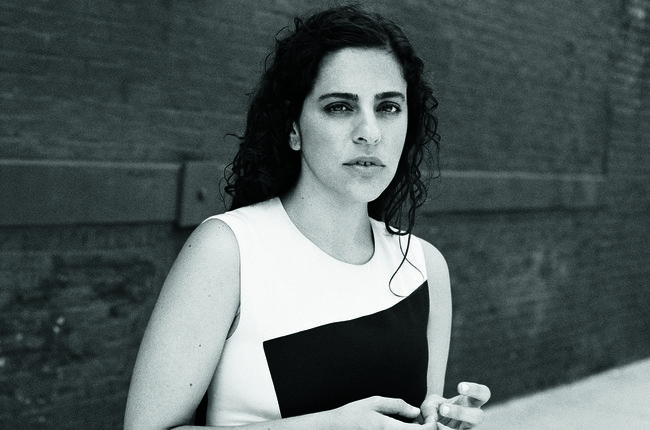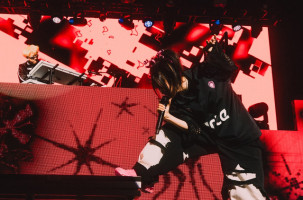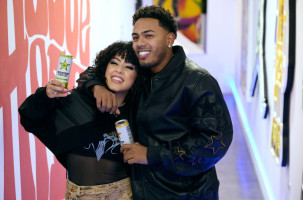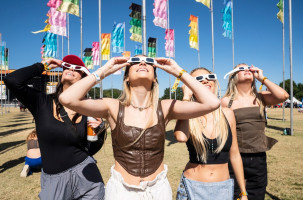“America is in the middle of a sexual revolution and the rules are constantly changing,” says Vanessa Grigoriadis, who authored the recently released Blurred Lines: Rethinking Sex, Power, and Consent on Campus, noting that today’s music stars play a crucial role.
Because many of these issues begin and play out in college, the award-winning journalist interviewed 120 university students and spoke to an array of activists, school administrators, and parents to craft her guide to the sexual assault debate. In several chapters of Blurred Lines, Grigoriadis highlights the power that pop stars are having on today’s impressionable teens. Billboard caught up with Grigoriadis to discuss the influence of Drake’s lyrics, Miley Cyrus' lewd antics and pop stars who look like porn stars while professing to be feminists.
Billboard: What inspired Blurred Lines?
Vanessa Grigoriadis: In Robin Thicke’s song, “Blurred Lines,” the important line is “I know you want it but you’re a good girl.” That really was one of the earlier indicators that societally we were starting to think about sexual assault in a different way or at least starting to talk about it in a different way. That song, in all of its ridiculousness, was the song of the summer in 2013 but was also widely criticized in no uncertain terms all over the Internet. A song like that, even three years earlier, would never have been talked about as a rape culture song in the mainstream media. My book is about making those lines straight and clear and a fight on college campuses to make that all happen.
You mention pop stars like Miley Cyrus in the book. What role have these musicians played in the current rape culture?
Miley Cyrus wants to do a “Wrecking Ball” video with Terry Richardson. She wants that video to be as provocative as it can be and she knows that Terry is talented. Her sense of activism may not extend to pass on him as a videographer. Taylor Swift is notably making music that attacks other women, particularly Katy Perry. At the same time, both Miley and Taylor are saying they support women’s rights, that they feel that now is the time for women to speak out strongly and show their power and that girls should feel confident and not let boys bring them down or rule their lives. That’s also a strong message. Do we want to congratulate them for some of the message or do we want to denigrate them for the part they are missing? And that’s a hard call.
Kesha and Lady Gaga are symbols of young millennial women who are willing to be up front about trauma that they have experienced but are adamant about taking power back from their situations. In Kesha’s case against Dr. Luke, which is not an open-and-shut case, the fact that she was supported so openly by colleagues like Demi Lovato and Fiona Apple, Taylor Swift giving her $250,000 for her legal fees. There was a groundswell of support for somebody who is a victim but may not have the evidence to actually get anywhere in criminal court.
Lena Dunham wrote an essay about Kesha, in which she says it wasn’t so long ago that famous women watched other famous women come out and say that they were victims on TV but didn’t want to support them because they were afraid that somehow that would boomerang and make men not want to hire them for jobs. But those days are over. We can expect to see this go on, whether it’s in the realm of sexual assault or domestic violence or record contracts that are unfair. I think the girl power of Twitter is unstoppable.
How has pop feminism affected the sexual revolution?
The rise of pop feminism coincided with the rise of Obama. And that pop feminism in a lot of ways did work for girls who are in college now. It gave them a sense of purpose in the world, which was very different than what the girls who grew up trying to emulate Britney Spears had. These girls in college now are post-Britney. They were so little when Britney was around and they look at a manufactured star like her with a lot of skepticism. But they are not skeptical of women who are owning their sexuality and who are presenting it as: “I’m Nicki Minaj. I am calling all the shots myself, even the sexual ones.” They want authentic stars. They are part of the rise of Taylor Nation.
On one hand, pop feminism made girls more aware of the rape culture because it makes women feel self-confident and sexually self-confident. And it’s part of why they have decided to call out boys who don’t treat them right, because they feel self-assured enough to do that. On the other hand, there is no ability for anybody to become a pop star if they don’t look and act like a porn star today. You have to sell sex as a package, which you always did but not as overtly. That has been a paradoxical thing; we have this pop feminism at the same moment that every pop star basically looks like a porn star.
How does the recent Taylor Swift groping case play into all of this?
Five years ago, America would say “Taylor what you doing? Why are you making such a big deal out of this? Are you just trying to get attention? Are you just a fame whore, Taylor?” That was not the response here. She’s setting a new standard for what should be labeled sexual assault and what should be considered taboo in our culture. To have the most important pop star in the country do that is a pretty extraordinary moment.
Is the popular music on campus affecting the dialogue?
In my book, I talk a lot about Drake as the guy who thinks, “Why do I need an independent women to feel like she needs me?” as he says. That’s the kind of thought process that a lot of guys are going through. The music college kids are listening to are Chance The Rapper, Childish Gambino, Post Malone. And there is a vulnerability to some of those guys. They are not presenting a bulletproof misogynist; they are saying, “OK I may be in a man’s world but I can see a woman’s perspective.” Male stars are beginning to see that there is a consciousness rising among women and that they need to react to that in their music, that they can play with their own sexuality in a way that they couldn’t before. You can be a gay rap star. You can wear a dress if you really want to, you can wear a kilt.
In what way can entertainers continue to advance this discussion?
I think they can continue to police the issue a little bit. I think they can continue to support each other and call out producers and people that cross the line. I think that they can get deeper with their activism supporting women’s issues. And if they are pro choice they should be talking about being pro choice. If they want to get more sophisticated in the way they look at feminism, I think everybody would benefit from that. I also think that they have to reckon with the fact that they’ve turned themselves into sex objects and as they get older, they have to think about what the path is and how they might model a more deeper femininity. I think we have a lot of stars right now who are aging into that time, like Katy Perry.
What are some of the more shocking things that you heard about while doing Blurred Lines recon on campuses?
I interviewed a woman who used the pseudonym “Blackout Blonde” and she said, “I’m an unrepentant party girl. I don’t even really believe in sexual assault. If something happens one night, you should just blame that on Jose Cuervo.” And then I met activists at radical campuses who told me that anything that was at all murky in terms of sex was rape, and really felt that using the language of rape was powerful, and that boys deserve to have that label on them and they should be kicked out of school. I met a UT Austin student who -- as much as you might make fun of him for saying this -- was really thinking about what consent means. He said, “I read something on a magazine the other day and it was like ‘How to be a real man: Shave with the grain the first time, never point a gun at somebody if you don’t intend to shoot them, always buy tools you don’t need to replace, and never have sex with somebody who doesn’t want to have sex with you.’” And that’s the ultimate message here: No. What’s promoted in songs does not always need to be the case.








